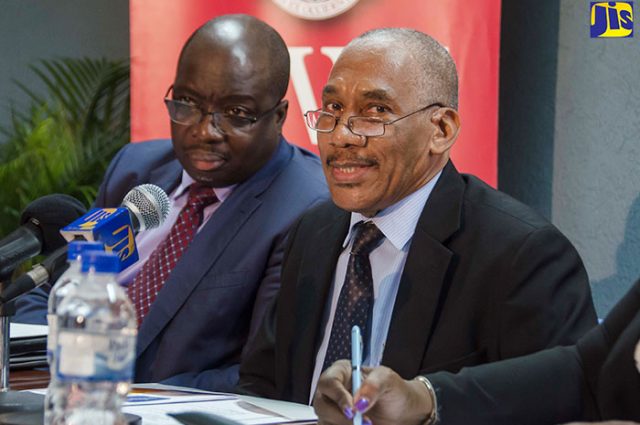JIS: The Third International Conference on Technical Vocational Education and Training (TVET) in the Caribbean will be held from May 10 to 12 at the Hilton Rose Hall Resort and Spa in Montego Bay, St. James.
The conference, themed ‘TVET for Sustainable Regional Development’, will be attended by local, regional and international officials of key government ministries and agencies as well as private-sector organisations.
The conference was launched during a press briefing at the University of the West Indies’ (UWI) Mona Campus in St. Andrew on Wednesday, April 26.
In his remarks, Conference Chairman, Professor Halden Morris, said the primary objective of the event was to create an advocacy platform for integrating sustainable principles in regional TVET polices, practices and programmes.
“We particularly view this conference as important because it is including broader dynamics of industry in our midst. TVET is about preparing persons to take us to the next level where the workforce is concerned,” he said.
Professor Morris informed that the conference specifically seeks to encourage a participatory approach during research presentations, and facilitate a high-tech exposition by industry and commerce stakeholders.
“We need to explore TVET innovations for sustainable creative solutions to the challenges that we experience in the Caribbean. We need to move our workforce from the entry-level preparation to advanced-level preparation so we can access economic gains moving forward,” he further stated.
Meanwhile, Deputy Chief Education Officer, Lena Buckle-Scott said the Ministry of Education, Youth and Information is particularly pleased to be partnering in the conference’s staging.
She said the Jamaican education system has long recognised the role of TVET in realising sustainable development.
Mrs. Buckle-Scott cited the development of a TVET policy and an integration model, which have been providing a regulatory framework for programme development and sustainability.
“The Ministry has commenced the roll-out of a National Standards Curriculum (NSC) which has integrated TVET in early years learning (from) grades one to six. In fact, TVET is integrated at grades one to nine, and it also stands as a discrete discipline at grades seven to nine,” she stated.
The Deputy Chief Education Officer noted that all schools offer at least one TVET subject and, further, that there are currently 130 schools offering three or more TVET subjects.
She stated that students have the opportunity to sit exit examinations in the Caribbean Secondary Education Certificate (CSEC), Caribbean Vocational Qualification (CVQ) and National Vocational Qualification of Jamaica (NVQJ), and City and Guilds.
“Another key aspect of our best practices is Resourcing TVET. The Ministry pays in excess of $100 million per year on exam fees for students, and over $150 million has been expended for this year on the provision of equipment for schools under the Rationalisation of TVET resources in schools,” Mrs. Buckle-Scott informed.
Meanwhile, she said the Ministry has reviewed the Labour Market Survey to identify new and emerging programmes and, consequently, new subject areas have been introduced.
Among these are Logistics and Supply Chain Management, Digital Animation, Printing and Computer Graphics, Call and Contact Centre Operation Level 1, Customer Service Level 1, Food & Drink, Fashion Designing, Floral Arrangement, Motor Vehicle Air Conditioning System Level 2, Renewable Energy, Apiculture, Crop Production and Small ruminants – goat- and sheep-rearing.
The conference is being hosted in conjunction with the University of the West Indies; Education Ministry; HEART/Trust NTA; British Council; University of Technology Jamaica; Petroleum Corporation of Trinidad; and the United Nations Educational, Scientific and Cultural Organization.
Topics being covered include quality assurance in TVET for youth empowerment; innovation and entrepreneurship propelled by quality TVET for wealth creation; and financing TVET for sustainable global reach.
CAPTION: Chairman of the Third Technical Vocational Education and Training (TVET) in the Caribbean, Professor Halden Morris, addressing Wednesday’s press launch at the University of the West Indies’ Mona Campus in St. Andrew on Wednesday, April 26. At left is Education Programme Specialist, United Nations Educational, Scientific and Cultural Organization, Dr. Claude Akpabie.


